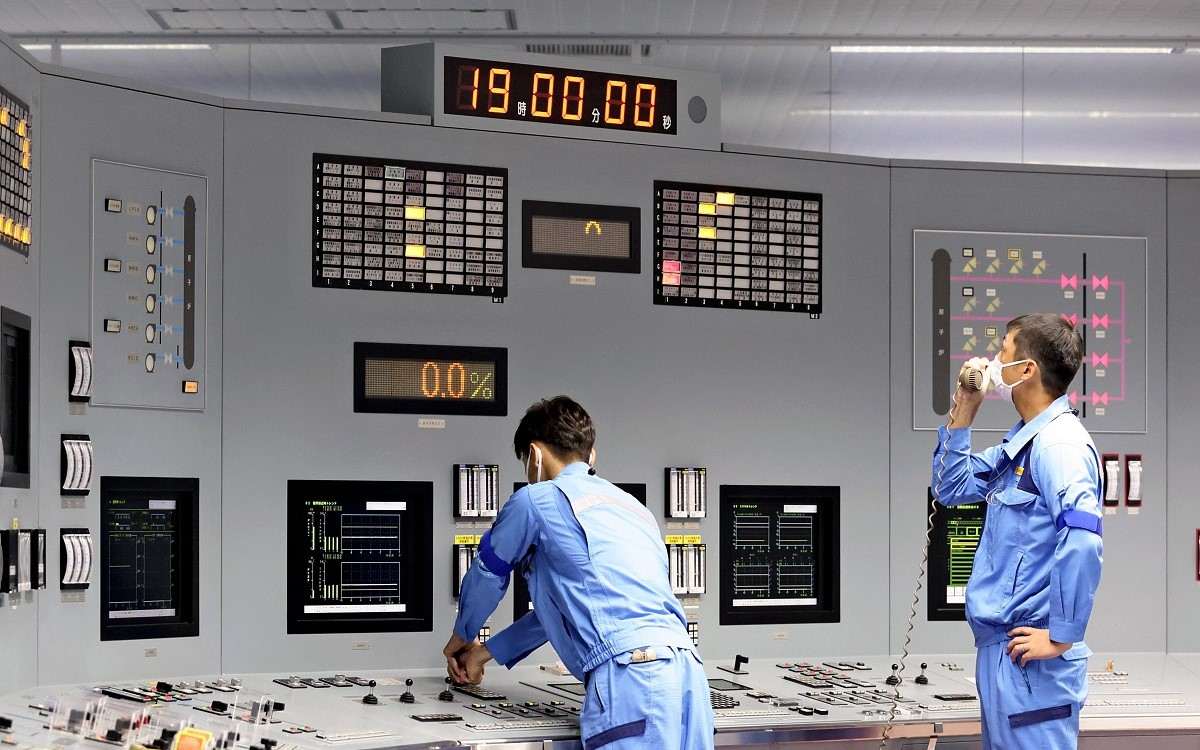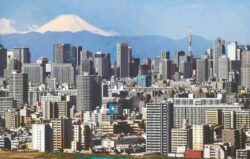Restart of Reactor at Onagawa Nuclear Power Plant in Eastern Japan Is a Step Toward Improving Electricity Supply, Demand

Operators perform the startup operations at the No. 2 reactor of the Onagawa nuclear power plant in Onagawa, Miyagi Prefecture, on Tuesday.
16:00 JST, October 30, 2024
The restart of the No. 2 reactor at the Onagawa nuclear power plant of Tohoku Electric Power Co. in Miyagi Prefecture on Tuesday is a step toward improving the power supply and demand in eastern Japan.
With the nation’s electricity demand expected to continue growing, the government intends to restart other nuclear reactors to ensure stable supplies.
Subhead: Commercial operation in Dec.
“This is the first time a nuclear power plant has been restarted in eastern Japan since the [2011] Great East Japan Earthquake and, as a boiling water reactor [BWR], the first in the country since the disaster. This is an important milestone,” Economy, Trade and Industry Minister Yoji Muto said at a press conference after a Cabinet meeting.
He announced that there would be no calls for businesses and households to save electricity this winter.
The Onagawa No. 2 reactor is scheduled to begin commercial operation as early as December, which is expected to increase the supply capacity of the Tohoku Electric Power service area by about 5%.
This is also expected to have a positive effect in the areas covered by Tokyo Electric Power Company Holdings, Inc. (TEPCO), where the supply and demand is the tightest in the country.
Because the Tohoku region and Tokyo are connected by transmission lines between the power systems, up to 6.5 million kilowatts of electricity can be sent to Tokyo.
Tightening of standards
The government obtained Cabinet approval in 2023 to “make maximum use” of nuclear power as a decarbonized power source.
However, the restart of nuclear power reactors has been delayed, particularly in eastern Japan.
Fifty-four reactors were operating in the nation before the disaster. Since then, it has been decided that 21 are to be decommissioned. The number of reactors that have passed the safety screening under the new regulatory standards remains at 17.
The new regulatory standards were drawn up in the wake of the accident at TEPCO’s Fukushima No. 1 nuclear power plant, which led to stricter standards for measures against natural disasters such as earthquakes and tsunami.
As a result, electric power companies have had to take time to respond to the new standards, causing the Nuclear Regulation Authority’s screening process to become protracted.
Disparity in electricity prices
According to the government’s Strategic Energy Plan, the government aims to raise the level of the nuclear power ratio to 20%-22% of total power generation in fiscal 2030, but the ratio was only 5.5% in fiscal 2022.
The reactors that will follow the restart of the Onagawa No. 2 reactor have not been decided, except for the restart of the No. 2 reactor at Chugoku Electric Power Co.’s Shimane nuclear plant in Matsue, which is scheduled for December.
TEPCO passed safety screenings for the No. 6 and No. 7 reactors at its Kashiwazaki-Kariwa nuclear power plant in Niigata Prefecture in 2017, but the company has yet to obtain local consent to restart them.
There is a disparity in electricity prices, as prices in eastern Japan are about 20% higher than in western Japan due to the delay in restarting operations.
The amount of electricity needed is expected to increase in the future due to the spread of artificial intelligence and the growth of data centers.
If the power supply system remains inadequate, there is a risk that it will hinder the attraction of semiconductor factories and others, observers said.
Top Articles in Society
-

JAL, ANA Cancel Flights During 3-day Holiday Weekend due to Blizzard
-

Record-Breaking Snow Cripples Public Transport in Hokkaido; 7,000 People Stay Overnight at New Chitose Airport
-

Australian Woman Dies After Mishap on Ski Lift in Nagano Prefecture
-

Foreign Snowboarder in Serious Condition After Hanging in Midair from Chairlift in Nagano Prefecture
-

Train Services in Tokyo Resume Following Power Outage That Suspended Yamanote, Keihin-Tohoku Lines (Update 4)
JN ACCESS RANKING
-

Univ. in Japan, Tokyo-Based Startup to Develop Satellite for Disaster Prevention Measures, Bears
-

JAL, ANA Cancel Flights During 3-day Holiday Weekend due to Blizzard
-

China Confirmed to Be Operating Drilling Vessel Near Japan-China Median Line
-

China Eyes Rare Earth Foothold in Malaysia to Maintain Dominance, Counter Japan, U.S.
-

Japan Institute to Use Domestic Commercial Optical Lattice Clock to Set Japan Standard Time






















